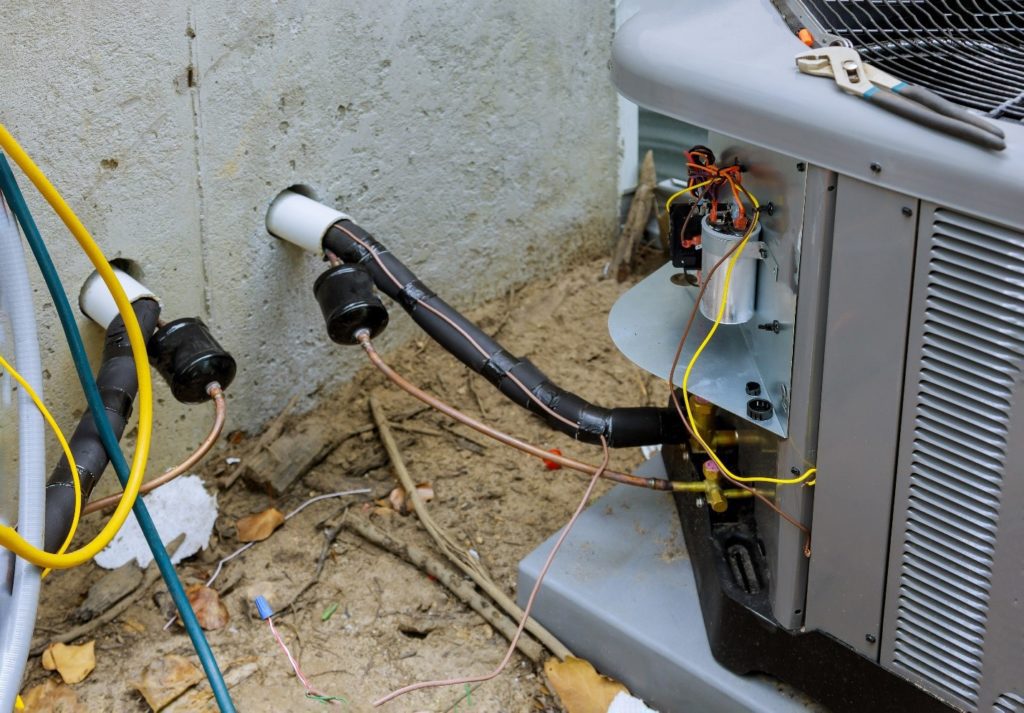A/C units that are working properly have no problems blasting out cool air all day long. So, when you notice that your air conditioner isn’t doing the heavy lifting it once was and isn’t blowing out cold air, it’s a safe bet that your A/C line has frozen up.
Frozen refrigerant (freon) lines cause the temperature inside your home to skyrocket, and they can freeze up even during the summer.
That’s right: your A/C lines can freeze right in the middle of summer, even when temperatures are blazing hot outside.
It’s important that you act quickly if you find that your A/C unit’s refrigerant line has frozen. With more than 40 years of experience, GetBest’s experts can help fix homeowner’s cooling issues on the spot. The team at Best Home Services is here to explain why A/C refrigerant lines become frozen and how you can quickly fix them.
How to Spot a Frozen Refrigerant Line Fast
All too often, homeowners neglect potential issues with their A/C unit until their problems become too tough to handle alone. There are typically at least a few signs to look out for that may indicate you’re due for an A/C leak repair.
If you’re searching for signs of ice buildup in your A/C unit, it’s a good idea to start with your indoor thermostat. Air conditioning units that have frozen freon lines can prevent your indoor temperature from reaching your thermostat’s setting. Eventually, this issue gets bad enough that the temperature becomes unbearably hot inside your home.
Once your air conditioner is no longer doing its job properly, your upstairs bedrooms and bathrooms will be the first rooms to get uncomfortably warm no matter how many times you adjust your thermostat. If your indoor temperature isn’t budging even after you try to change your thermostat settings, then it’s time to take a look at your evaporator.
Locate the supply register – the vent grille – on your A/C unit to see if the air that’s coming out of it is warm. Supply registers that are blowing out warm air are usually good indicators that ice is accumulating in your evaporator. Refer to your air conditioner’s instruction manual if you need help identifying your evaporator and begin checking for moisture that’s frozen.
Frozen evaporator coils with thin layers of ice indicate that the freon in your air conditioner is too cold and is causing moisture to freeze. There are multiple possible reasons for your air conditioner’s freon levels to drop below 32 degrees Fahrenheit, even during the summer; let’s look at the most common reasons for a frozen A/C line to occur.
Why Is My Refrigerant Line Frozen?
Air conditioning systems with functioning refrigerant lines have no issues cooling air down with their evaporator coils. Evaporators that work properly absorb heat from the air they take in and cool it down with their refrigerant. Air conditioners that run into certain problems, though, start to struggle with their cooling and heat absorption.
Why, though, do refrigerant lines sometimes freeze, even in the middle of scorching-hot summer temperatures? The answer usually has to do with your evaporator’s airflow or freon levels.
Your Evaporator’s Airflow Is Restricted
The airflow that circulates over your evaporator can become restricted for a few reasons. Poor airflow over your evaporator coils can cause moisture to start freezing in your refrigerant line, which can wreak havoc on your home’s indoor temperature.
Best Home Services recommends that you check for the following signs if you suspect your air conditioner’s airflow is restricted:
- Your air filter is dirty. Dirty air filters that are clogged with debris can make it hard for air to flow properly. Try to change out your air conditioner’s filter at least once a month to prevent condensation from forming and freezing on your evaporator coils.
- Your return vents are blocked. Air conditioners with blocked return vents have no way of properly circulating cool air throughout your home. Your A/C unit needs unrestricted return vents to properly pull in air and condition it. Always keep your return vents free of anything that might prevent air from circulating freely.
- Your supply vents are closed. Supply vents that are closed restrict the circulation of cool air inside. It’s a bad idea to close your supply vents even in rooms you don’t use since poor airflow can eventually cause moisture on your refrigerant line to become frozen.
- Your evaporator coil is clogged. Your air conditioning unit’s evaporator coil has a collection of copper tubes that promotes cooling and adequate absorption of heat. When your evaporator coil becomes clogged with dirt, though, your A/C system can’t function properly. It’s important that you contact A/C leak repair professionals like Best Home Services to prevent the buildup of dirt in your unit’s evaporator coil.
Your Freon Is Leaking
The freon that flows in your refrigerant line is responsible for absorbing heat from air and pushing that air through your outdoor condenser. Once your freon starts to leak, your refrigerant levels inevitably take a dive. If your refrigerant levels fall low enough, your freon can even start to freeze because there’s no longer adequate pressure in your refrigerant coils.
Leaking freon means that it’s only a matter of time until your air conditioning system starts to falter. Insufficient refrigerant levels negatively impact how well you’re A/C system can move and condition air. Eventually, your energy bills are going to feel the heat.
Rather than Google “A/C leak repair near me” for hours on end, contact a team of HVAC experts who can quickly find your freon leak and fix it for good. Make sure that you let the team at Best Home Services know about your leaking refrigerant as soon as possible so that we can provide timely assistance. Our team can help clear your A/C system of all its remaining freon and refill your refrigerant to appropriate levels.
Fix Your Frozen Refrigerant Line for Good
By now you hopefully have a better understanding as to why, exactly, refrigerant lines freeze up. Now it’s time to talk about solutions.
Before you do anything else, double-check that your A/C unit isn’t running. Air conditioners that are still running even with frozen evaporator coils can break down on the spot and cause your A/C leak repair cost to soar.
Once you’re no longer running your unit, take a look at some of the below solutions to fixing frozen refrigerant lines:

Thaw Your A/C Unit
A recommended first solution to A/C line freeze-ups is to try thawing your refrigerant line. Here’s how to quickly thaw your ac refrigerant line: First you turn your ac thermostat off and turn the fan on high. Leave the fan running for a few hours to overnight depending on the outside temperature and your refrigerant line should be fully thawed. Thawing out your refrigerant line, although only a temporary solution, can at least protect your compressor from damage and prevent your freon lines from freezing, for the time being.
The reason that thawing your freon line is a temporary solution is that it doesn’t address the root problem. Even if you thaw out your line and protect your compressor from damage for a while, your lines will soon enough freeze due to an underlying issue.
If you do decide to thaw your refrigerant line for the time being, get ready to collect any moisture that builds up as you thaw your A/C unit. Collecting the water that builds up during the thawing process can help you avoid water damage to your delicate air conditioning system. Let your evaporator coils dry after you’ve thawed everything out, switch on your blower, and promote warm air flow using your unit’s lowest heat setting.
Keep Your Air Vents Open
Always make sure that your air vents are open in every room of your home. It’s important to keep your A/C system’s supply vents and return vents always open to prevent airflow restriction.
It’s possible to block your air vents even if you’ve opened them. Check each of your vents for blockages caused by things like electrical appliances or smaller pieces of furniture. Blockages can obstruct airflow over your evaporator and cause problems with your A/C system’s heat exchange.
As important as your system’s heat exchange is, it’s even more important to keep your energy bills as low as possible. An HVAC system with unobstructed air vents contributes to lower pressure inside your ducts, fewer losses of cool air due to leaks, and, of course, lower energy costs.

Switch Out Your Air Filters
Clogged and dirty air filters need to be switched out as soon as possible. Do your best to change your air filter as often as possible to avoid poor indoor air quality. A properly functioning A/C unit maintains a longer lifespan the more often you change its air filter.
How Do I Know If I Should Contact an A/C Repair Company?
Even if you’ve followed all our above suggestions to a tee, your issue may persist. If you’ve thawed your refrigerant line, changed your air filter, and opened all your HVAC system’s return and supply vents and are still experiencing issues, then it’s time to contact an HVAC company.
It’s recommended that you call a team of A/C leak repair professionals like those at Best Home Services for a general inspection of your air conditioner. A/C repair professionals can check for specific issues such as:
- Damaged air ducts. Air ducts that are torn or even completely collapsed can prevent proper airflow over your evaporator coil. A team of A/C repair professionals can check for damage to your air ducts and duct joints. Most of the time, HVAC experts can seal up torn ducts on the spot to bring your energy costs and indoor temperatures back to normal.
- Freon that’s leaking. Refrigerant leaks cause the pressure in your lines to plummet, which in turn causes moisture to freeze. If you have a freon leak in your A/C lines that’s causing moisture to freeze, it’s often easiest to quickly fix it with professional assistance. HVAC professionals can identify your refrigerant leak and restore the pressure levels in your lines to normal.
- Malfunctioning blower motors. Blower motors that are no longer working the way they should obstruct your A/C unit’s air intake and cause ice to build up in your refrigerant lines. If you notice that your blower fan is slowing down and having trouble spinning when it starts up, there’s a good chance that you need professional assistance to fix your motor.
Need an A/C Leak Repair Fast? It’s Time to Call Best Homes Services
Frozen A/C lines can quickly turn a nice summer day into a boiling hot nightmare. If you think you may have a frozen refrigerant line and aren’t sure what your next steps should be, then it’s time to contact Southwest Florida’s go-to source for A/C leak repairs.
Don’t let your frozen A/C lines linger if you’re not sure how to handle the issue yourself. Get in touch with the Best Home Services team today by giving us a call at (833)-263-3097!

